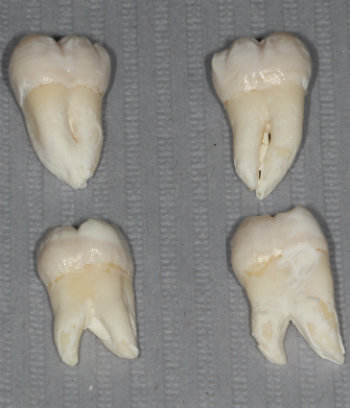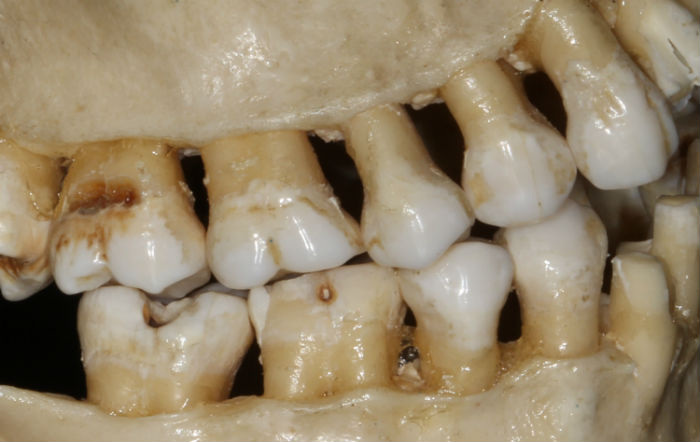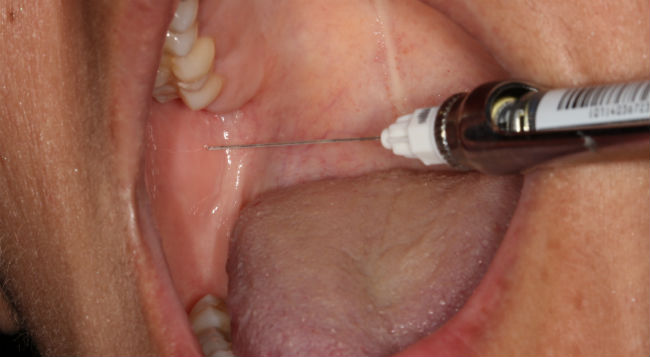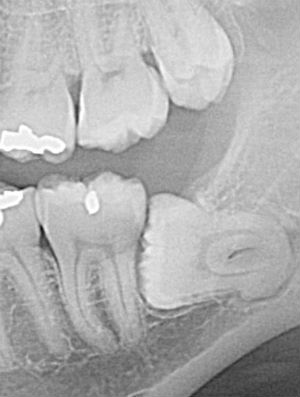In our dental office, we remove hundreds of wisdom teeth (a.k.a. third molars) per year. We perform all types of extractions – upper, lower, fully erupted, impacted, horizontal, etc. with or without IV sedation.

Only 2 of these 4 third molars resulted in significant pain afterwards. Want to guess which ones? Surgery by Dr. Nicholas Calcaterra.
As part of our review of the procedure with our patients, we always discuss post-operative pain relief. And we invariably end up saying something to the effect of:
“When the numbing wears off, you’ll likely be pain free with the top extraction sites, but for the bottom, you’ll definitely need to take the pain medications”
When we see our patients a week later for a follow-up, we then get asked:
“I didn’t feel any pain during the procedure. But the next day, how come the top wisdom teeth removal didn’t hurt but the bottom ones did?”
There are many reasons why upper (also called maxillary) third molar extraction sites often give little post-operative pain but bottom (also called mandibular) extraction sites frequently do. Here are some of the key differences:
Differences in the Bone Holding in the Teeth
Teeth are held in your jaw because they are encased in bone. The bone holds them tightly in place. So it stands to reason that if some bone is denser and can hold the tooth in more securely, those teeth will be harder to remove. Right?

This photo of a human skull shows how teeth are held in place by bone.
The bone that holds upper wisdom teeth in place is neither dense nor strong. It can best be compared to Styrofoam. On the other hand, the bone that holds lower wisdom teeth is dense, thick, and strong. It can best be compared to pine wood.
So, if you have a tooth encased in either pine wood or Styrofoam, which do you think will require more effort to get out? Of course it’s the pine. So that extra strength that holds lower wisdom teeth in place – ends up resulting in greater effort to remove – and is one reason that makes lower wisdom teeth hurt more.
Dry Socket Occurs More Often with Bottom Wisdom Teeth
Dry socket, also known as alveolar osteitis, is a painful condition that can occur after any tooth extraction. Research has shown that the incidence of dry socket for all tooth extractions is 2%, but is seen 20% of the time for impacted lower wisdom teeth.
What this means is that, generally speaking, there is a 10 times greater likelihood of a dry socket with a lower wisdom tooth than an upper. This again is another reason why lowers can hurt more.
Different Types and Number of Injections
Some of the other reasons for the difference in post-operative pain include the number and site of injections.
To properly anesthetize an upper wisdom tooth, there are only a couple of injections needed. They are typically shallow and have high success rates. While one of the injections can be painful, it does not result in significant pain post-operatively.

A mandibular block injection for a lower third molar. The needle goes at least one inch deep through muscle. Expect at least two of these injections for a lower wisdom tooth extraction.
Conversely, lower wisdom will often need multiple injections, including a minimum of two that must penetrate at least an inch through muscle. And because lower wisdom teeth can have many nerves associated with them, it is not uncommon to need 5 or 6 separate injections.
If you received multiple injections into your leg through one inch of muscle until the needle hit bone versus two injections where the needle only went in an eighth of an inch, which would hurt more the next day?
Gravity
After removal, there are empty sockets or holes where the teeth used to be. These holes are the perfect size for small pieces of food to accumulate. Significant accumulation of food can lead to delayed healing, infection, and pain.
Gravity ensures that the lower sockets accumulate much more food debris than the top. This is another reason why lower wisdom teeth surgery leads to more pain than the upper ones.
Proximity to Delicate Anatomy

This impacted lower third molar is very close to a major nerve and artery.
Impacted lower wisdom teeth are often close to very important anatomical structures such as a major nerve and artery that supply the lower jaw, chin, and other areas. In order to avoid inadvertently damaging those structures, a slow approach is often taken.
The longer a surgical site it open and manipulated, the more post-op pain and swelling will result. And the greater a likelihood of infection.
While upper third molars have their own set of considerations and risks, it is very rare that such a slow approach must be taken. In the x-ray, the upper wisdom tooth took approximately 1 minute to remove, while the lower over 20 minutes.
Which site do you think hurt more the next day?
Exparel is Typically Used for Lower Wisdom Teeth
Have you heard about Exparel? Exparel is an opioid free pain management solution – designed to relieve pain after surgery. We use it in our office after extracting four wisdom teeth. For the most part, we administer it on the bottom.
The vast majority of studies – including this one – typically test the effectiveness for lower wisdom teeth. Why? Because the top ones typically don’t hurt as much.
 Do you need a wisdom tooth or teeth removed? Interested in a consult? Want IV sedation? Call us at (203) 799 – 2929 or visit this page for an appointment.
Do you need a wisdom tooth or teeth removed? Interested in a consult? Want IV sedation? Call us at (203) 799 – 2929 or visit this page for an appointment.

Wonderful information. I am going to have an upper molar third molar extracted soon and I was scared (presently I have no pain). They informed me that there is decay below the gum line that is why I needed to have it extracted.
Your information has certainly set my mind at ease. If I lived in CT, I would certainly go to you for an appointment. Thank you
Thank you so much for this. I only have two wisdom teeth and they’re both upper. I have them set to be removed tomorrow and was feeling really worried. I feel nervous still, but much more at ease to understand why my last two dentists kept saying mine would be a quick process, despite hearing so many horror stories. Thank you.
Thanks for putting this info out! I had my upper and lower wisdom teeth removed a week ago and the upper sites are healed but I’m still taking OTC pain medication for the lower. It puts my mind at ease that the slower healing of the lower sites is not unusual.
Erin,
Thank you for your comments. Your experience is typical – and it is exactly why we wrote this article!
Thanks for putting this information together, I removed my lower wisdom teeth 5days ago and the pain got me worried, I think this information will help me a great deal.
Thanks for this! Was super nervous to have my two upper wisdom teeth extracted today but reading all of this helped. It literally took longer for my dentist to numb me up than it did to extract them. And there’s literally no pain as of right now despite the numbing medication wearing off.
Great! Glad you had such a good experience, at least as far as getting two teeth extracted. As you experienced, generally speaking, upper wisdom teeth extractions are less invasive and less uncomfortable post-operatively than lower wisdom teeth extractions.
I had my left top and bottom wisdom teeth removed and I kept wondering why the bottom one was so much more difficult to extract and painful after, but now I know why, Thank you!
Thanks for the great information. I just got my 2 wisdom teeth ( Right top and bottom) removed 3 days ago. So i have the 3 day jitters because i am a CNA so i have to pick up, turn over patients on a daily basis, and what stuck out to me is that “your not suppose to pick up any thing, heavy” or you could dislodge the clot. I had to do that within my 3 days. And its main the bottom that i am having pain out but no symptoms relating to a dry socket. So i hope i am ok with having to work and no really bad pain with it being 3 days since. Also i had my top left removed first and didnt feel pain like i do the bottom right.
I was told that I have 3 wisdom teeth. 2 upper and 1 lower. I just got them out today and wanted to see if upper or lower caused more pain. Thankful it was lower since I just have 1 of them. My side that I just got the upper removed from doesn’t even hurt. The only area of my mouth that hurts a lot is the lower side that I got the wisdom teeth removed from (it was close to a nerve so they had to cut it in half to remove it. No issues with either upper)
Kayla,
Thanks for posting your experience, which in general appears to be consistent with other patients. Generally speaking, pain can be worse approximately 48 to 72 hours after your procedure. Please let us (and other readers) know how you are doing on days 2 and 3. We suspect that only the bottom one will be hurting at that time.
I had my lower wisdom tooth pulled 4 days ago and it’s still keeps me up at night. Ibuprofen helps but it doesn’t last longer than 4 hours. Is there any advice on what I can do to relieve the pain so I can sleep longer than a few hours? How long does the pain typically last?! Thank you!!!
I just had mine remove two weeks ago! Top two and bottom left. It is true the worst pain is day 2-4. Swelling and bruising is the worse on the bottom. I iced the outside of my cheek 20 minutes on and 20 minutes off and I feel like that helped.
I’m in a really weird and goofy spot with some of my wisdom teeth. I have all four, but only the top two need to come out. I never developed bottom twelve year molars, so the wisdom teeth down there just moved into their place and took up the job as second molars. I’ve been told that it’s usually the other way around. Thankfully, they came in straight and perfect.
The top two on the other hand are a bit more normal for wisdoms. They’re straight, and from what I can see of the X-rays, they’re conical. They’re not impacted, and since my teeth are abnormally small, they don’t really crowd me too much. However, the right one has been hurting on and off and getting steadily worse, and the left one has recently started to join in. An extraction seems to be in my future. I’m no expert, and my layman’s judgment of my x-rays seems to indicate that they’d come out easily. But I’m so anxious that even the act of numbing me up makes me nervous, never mind the procedure, so I wanted to opt for IV sedation. Am I being too overdramatic over this?
Thanks for the comment.
Each and every case is different so it is impossible to know details without an exam and x-ray. But, from this blog post, you know that upper wisdom teeth typically result in less pain than bottoms. Teeth that are in your mouth completely usually come out more easily than those that are not fully in. And conically shaped roots usually facilitate easier removal than splayed roots. So, your case is likely not that invasive.
But if numbing makes you nervous, then you might want to consider the sedation. Even “easy” cases require numbing, stretching back of the cheeks to gain access, and then lots of pressure and noises. So to answer your question, you should not feel overly dramatic about wanting IV sedation.
If it makes you feel any better, I’m a big wimp when it comes to getting anything done at the dentist other than a cleaning. My dentist told me I needed both upper wisdom teeth extracted and of course the anxiety kicked it. I did it in two separate visits. The numbing didn’t hurt at all. They put a flavored topical numbing gel in my mouth for a few min first and I barely felt the needle after that. My dentist had my wisdom tooth out in less than a minute both times I went. I didn’t even know it was out until he told me. I felt nothing and the recovery time was painless. I was a little sore for about 2 days, but it wasn’t anything a little ibprofen couldn’t fix. I even joked and told my dentist id rather have an upper tooth extracted over a filling any day of the week. Don’t be nervous, it’s not that bad!
I got my left wisdom teeth extracted two days ago, and I noticed that the top whole is healing significantly faster than the lower. I’m glad to see that isn’t unusual. When I had my teeth pulled the dentist said that my mouth was unusual, due to the fact that he had to numb my top wisdom tooth more than the bottom for extraction. It’s interesting to see the comparisons in the original post. Thank You!
It’s been a week since I’ve gotten my top two wisdom teeth removed and I’ve shockingly had no pain at all. Im wondering when the two holes will heal fully and fill in? I’ve been on a strict soft food diet to not irritate the surgery site. Also, when will it be safe to eat regular foods? I’ve been craving pizza and I’m hesitant on eating because I don’t want to delay the healing process. I’ve also been very nervous about getting dry sockets. Another question I have is about the blood clots that had formed. Do the blood clots disappear after a week? Lastly, when will it be safe to resume my habits and indulge in smoking? I’ve seen various sources tell me completely different things. Some say after 72 hours, others say after two weeks to prevent dry sockets. In your professional opinion, which should I trust? I have been playing it safe and decided to wait about 2 weeks. Please let me know. (sorry for asking so many questions. this is my first surgery and I’m hesitant about doing things that could delay my recovery.)